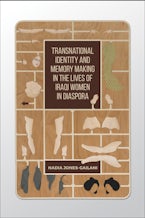This book draws on an extensive archive of over one hundred oral narratives collected and recorded with Iraqi women in three sites: Amman, Detroit, and Toronto. Nadia Jones-Gailani demonstrates how the relationships between ethno-religious migrants, nation, and citizenship are shaped by the traumatic experiences of forced displacement and integration into new communities and national imaginaries. This book also examines the broader historical trends that have precipitated migration from Iraq.
While informed by research into the archival documentary record on Iraqis in North America, this book is first and foremost a study of gender and memory that focuses on women’s oral histories. By historicizing the process through which ethno-religious and ethno-national communities become fractured and remade, Jones-Gailani explores the expectations and realities of women as the supposed biological and cultural reproducers of the nation. The Iraqi women featured in this book assert their claims to belonging across three different generations, thereby opening up spaces to discuss how sites of migration shape the ability of migrants to lobby for "the homeland," even as they engage in daily struggles to advance their education and economic stability abroad.

